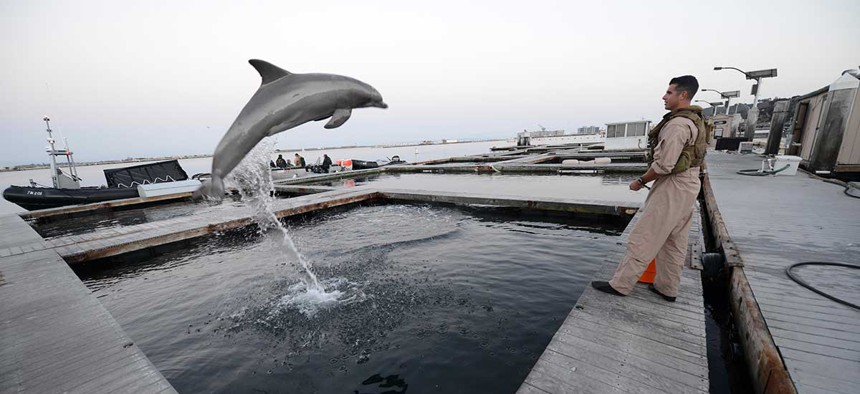
Hull Technician 2nd Class Christopher Burgess assigned to Explosive Ordnance Disposal Mobile Unit 1, works with a bottlenose dolphin prior to a night training exercise in 2013. Mass Communication Specialist 2nd Class Joshua Scott/Navy file photo
The Navy is Retraining Its Mine-hunting Dolphins to Help Save an Elusive, Endangered Species
There may be fewer than three dozen vaquita porpoises left in the wild.
Everything is fair in war, even deploying dolphins. Since the 1960s, the US Navy has run a marine-mammal program that trains dolphins and sea lions to achieve feats that even the best machines can’t: sniffing out mines, navigating when lost in the open sea, and acting as security guards for strategic assets.
For their newest mission, these genius dolphins are likely to feel a little more at home. An international committee of experts set up to save the elusive and critically endangered vaquita porpoise,which lives in the Gulf of California, has partnered with the US Navy’s dolphin program. The task for the dolphins is to locate the last remaining vaquitas using their natural sonar, which involves producing certain sounds and identifying objects by the reflected sound waves. Once dolphins find a porpoise, the Navy told the Associated Press (AP), they will show its location “by surfacing and returning to the boat from which they were launched.”
There may be fewer than three dozen vaquitas left in the wild, and their population has been declining at 40% per year because of illegal fishing. The fisherman aren’t after the porpoise itself, but unfortunately vaquitas share the waters with the highly prized totoaba fish. The totoaba bladder—a delicacy in China—can fetch as much as $100,000 per kilogram, and vaquitas are being driven to extinction as a by-catch in totoaba fish nets.
If the dolphins can locate the vaquitas, the committee is hoping to catch, enclose, and protect the last members of the species.

The critically endangered vaquita porpoise. (NOAA/Paul Olson)
However, some experts, like Omar Vidal, Mexico director of the World Wildlife Fund (WWF), oppose the plan. He believes that, once located, the process of enclosing the porpoise risks killing the last few remaining vaquitas. Up to now, the species has never been held or bred in captivity.
The experts—the International Committee for the Recovery of the Vaquita, set up by government bodies such as the Marine Mammal Commission and conservation organizations such as the WWF—say they are aware of the risks. They told the AP that the vaquitas caught will be closely monitored by veterinarians. If one dies, they are ready to rethink the mission.






